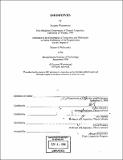| dc.contributor.advisor | Noam Chomsky, Alex Marantz, and David Pesetsky. | en_US |
| dc.contributor.author | Wurmbrand, Susanne, 1966- | en_US |
| dc.date.accessioned | 2009-01-30T18:36:39Z | |
| dc.date.available | 2009-01-30T18:36:39Z | |
| dc.date.copyright | 1998 | en_US |
| dc.date.issued | 1998 | en_US |
| dc.identifier.uri | http://dspace.mit.edu/handle/1721.1/9592 | en_US |
| dc.identifier.uri | http://hdl.handle.net/1721.1/9592 | |
| dc.description | Thesis (Ph.D.)--Massachusetts Institute of Technology, Dept. of Linguistics and Philosophy, 1998. | en_US |
| dc.description | Includes bibliographical references (v. 2, leaves [335]-351). | en_US |
| dc.description.abstract | This dissertation is an investigation of the structure of control infinitives, the mechanism of control, and the general architecture of clauses involving auxiliaries and modals. The dissertation challenges the idea that control infinitives are represented uniformly by a clausal (CP) structure. It is argued that control infinitives of a certain well-defined class are best analyzed as simple VP-complements that do not involve an embedded subject. The structure of VP-infinitives is motivated by five sets of properties that systematically differ from the properties of clausal control infinitives. First, VP-infinitives do not allow complementizer and wh-material (chapter two). Second, VP-infinitives do not exhibit tense related properties-VP-infinitives (in contrast to clausal infinitives) do not contribute independent tense information, and overt tense marker and modification of the embedded tense are prohibited in VP-infinitives (chapter two). Third, VP-infinitives do not involve a structural case position. Rather, the embedded object is assigned case by the matrix predicate (chapter three). Fourth, VP-infinitives do not involve an embedded syntactic subject (chapter four). Fifth, VP-infinitives are characterized as properties rather than as propositions semantically (chapter five). The second major contribution of this dissertation is that it provides a new approach to control. It is argued that there are two forms of control--syntactic or variable control vs. semantic or obligatory control. In contrast to previous theories, however, it is argued that only syntactic control-which correlates with non-VP-infinitives-is a relation between an antecedent and an embedded syntactic PRO-subject. VP-infinitives, which do not have a syntactic subject, involve semantic control (chapter four) which is to be understood in terms of a semantic entailment relation. Finally, this dissertation investigates constructions with complex verb phrases. It is argued that modal verbs and raising verbs in German are functional categories that are generated outside the VP in some inflectional head (chapter six). | en_US |
| dc.description.statementofresponsibility | by Susanne Wurmbrand. | en_US |
| dc.format.extent | 2 v. (351 leaves) | en_US |
| dc.language.iso | eng | en_US |
| dc.publisher | Massachusetts Institute of Technology | en_US |
| dc.rights | M.I.T. theses are protected by
copyright. They may be viewed from this source for any purpose, but
reproduction or distribution in any format is prohibited without written
permission. See provided URL for inquiries about permission. | en_US |
| dc.rights.uri | http://dspace.mit.edu/handle/1721.1/9592 | en_US |
| dc.rights.uri | http://dspace.mit.edu/handle/1721.1/7582 | en_US |
| dc.subject | Linguistics and Philosophy | en_US |
| dc.title | Infinitives | en_US |
| dc.type | Thesis | en_US |
| dc.description.degree | Ph.D. | en_US |
| dc.contributor.department | Massachusetts Institute of Technology. Department of Linguistics and Philosophy | en_US |
| dc.identifier.oclc | 42141033 | en_US |
